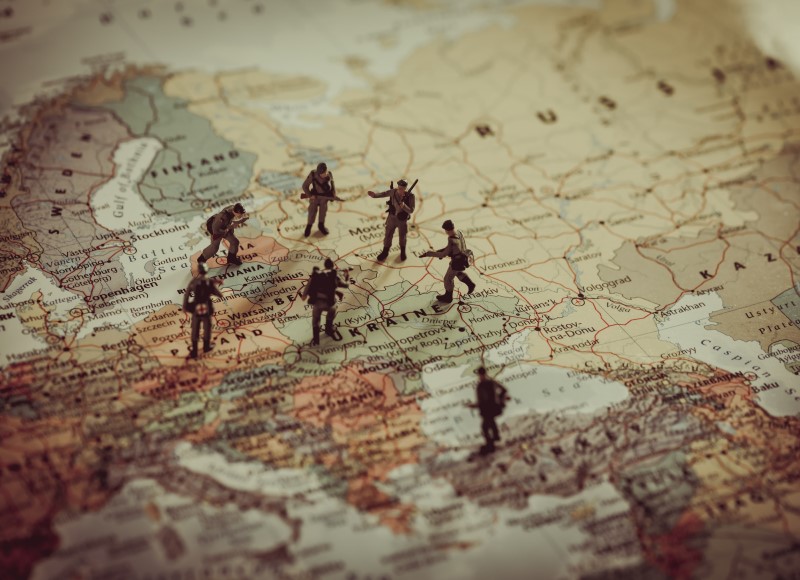Since the politicization of artificial intelligence is inevitable, now more than ever, each one of us should evaluate its potential impact on our respective nations— and be prepared for what is to come!
Introduction
The algorithmic revolution is here, and nations are losing control of not only their understanding of the potential impact of artificial intelligence but also the governance model that enforced accountability on the advances in science and technology over the years at all levels.
While each new technology innovation claims its territory for the economic advances in the human ecosystem with significant ramifications across cyberspace, geospace and/or space (CGS), the rise of artificial intelligence (AI) has not only undermined governance, management, and growth models but has also broken all barriers to boundaries defined by human decision makers. Besides, it is both blurring the boundaries between human intelligence and machine intelligence, and the boundaries between man and machine and real and fake.
As a result, the power dynamics are shifting away from the select few across nations (and is moving away from humans entirely to algorithms)—re-defining the criteria on which geopolitics was framed—and thereby threatening the foundations of global peace and security.
A New Era of Artificial Intelligence
Since the beginning of the technological age, each new idea, innovation, and invention has helped humans across nations usher in a new era of economic growth, changing the fundamentals of respective nations and their security. In this new era of artificial intelligence (AI) as well, the revolution and evolution of human ecosystems in cyberspace, geospace, and space (CGS) are inevitable. So, as nations have already started feeling the impact of emerging artificial intelligence systems, the question is how the AI trends will define and determine the global trajectory in the coming years? It seems geopolitical factors will likely play a determining role in the process.
While artificial intelligence brings each nation great potential, it also delivers significant geopolitical challenges that affect not only national security but also the foundations to the security of humanity. That brings us to evaluating some critical questions: How is artificial intelligence re-defining power? What are the security, social, economic and political consequences of the advances in artificial intelligence on a global level? Which artificial intelligence innovations including advances in hardware, software, processing power and more brings nations strategic security risks? How can nations prepare for any potential existential security threats?
Artificial Intelligence Battlefield
As artificial intelligence gives its creator/developer the power to create and control conflict at all levels, the race for infrastructure, data and intelligence are on for economic and security supremacy. While no nations or any of its components (whether they be individuals, government, industries, organizations, academia) are in any way prepared for the ongoing revolution and evolution brought on due to the developing battlefield of artificial intelligence, the reality remains that the battlefield is already drawn. Players are already engaging their entire war arsenals (including all conventional war weapons: nuclear, biological, cyber and more) to fight the unknowns of this artificial intelligence battlefield. It is essential to understand and evaluate who are the players on the artificial intelligence battlefield, what do they control (conventional war weapons as well as AI embedded war weapons), and what are the geopolitical implications?
For example, the risks posed by the convergence of artificial intelligence with nuclear weapons (or any other war weapon) technology is a stark reminder of the already complex geopolitical scene getting worse due to the potential disruption in already fragile alliances. Historically wars have generally not been fought alone, and partnerships have been the backbone of legitimacy for each battle. AI is now changing that. Artificial intelligence seems to have provided a spark to divide and disrupt the global alliances as we see with the stumbling of NATO and the EU (each nation seems to be on its own on its artificial intelligence journey). The historic alliance of the US and Europe is also strained at times, and this is perhaps just the beginning.
Shifting Balance of Power
Artificial intelligence is changing the balance of power, and the new emerging reality of every nation for itself seems to be a highly destabilizing event for global peace and security and the future of humanity. While technologies like artificial intelligence, machine learning, deep learning and more continue to speed up the pace of the technological revolution and are on their way to fundamentally transforming not only life on earth for humans in geospace — but also in cyberspace, space and the spaces that don’t exist in a human ecosystem yet, the shifting balance of political power is a cause of great concern.
Artificial intelligence is driving massive shifts across nations. Since artificial intelligence has the potential to redefine the relationships between nations, between man and machine and between the earth and the universe, what will change? To begin with, is the term geopolitics even relevant now since we have moved beyond geospace and expanded the human ecosystem to cyberspace and space? Perhaps it is time to coin the term CGS politics!
- What are conventional assumptions about the future of politics, within and across national boundaries being challenged by AI?
- How will AI reshuffle political relations and will it lead to the diffusion of political power or total state control?
That brings us to an important question: as artificial intelligence fundamentally disrupts the human ecosystem across CGS, will the idea of national alliances or even sovereignty survive?
The relationship between Artificial Intelligence and Geopolitics
It has been said that a nation’s technological trajectory over the years has been determined by its geography and existing infrastructure in geospace. This is changing rapidly and being replaced by digital infrastructure, digital data and the rapidly evolving artificial intelligence infrastructure, forcing us to re-evaluate whether geography still plays any relevant role in a nation’s trajectory.
As we see across nations, hardly a few dozen countries have some AI strategy (Australia
Canada, China, Denmark, EU Commission, Finland, France, Germany, India, Italy, Japan, Kenya, Malaysia, Mexico, New Zealand, Nordic-Baltic Region, Poland, Russia, Singapore, South Korea, Sweden, Taiwan, Tunisia, UAE, United Kingdom, and the United States). What about the rest of the nations? What are the determining factors of when and whether a nation will adopt artificial intelligence and how will it change their strategic course? For the remaining nations, do they lack digital infrastructure, thought leadership, human resources, capital availability, education systems, social acceptance and a vision for the progress and development of AI for their respective nations?
This is important to evaluate because understanding the relationship between artificial intelligence trends, national preparedness and geopolitics is fundamental to understand the future of humanity. It will be interesting to see how nations will face the unequal progression of AI technology across the CGS—and whether the emerging decentralization of AI resources and the choices of decision-makers will intersect to create different paths to a nation’s future—and for the future of humanity.
A New Artificial Intelligence Model for Development
Since artificial intelligence could disrupt the process by which nations develop, it will be critical in determining national trajectories. The nations with the best chance of even approaching that accomplishment are perhaps those that have a wealth of AI human resource capital at their disposal, like US-China, and many other developed nations, and even a country like India that is just waking up.
So, how will resources influence artificial intelligence development trends for nations with the necessary digital infrastructure, vision, and strategy? Human resources are at the core of AI development, especially when for example automated biometric technologies are already providing precision surveillance of humans, automated facial recognition technology is on its way to monitoring Chinese citizens, and AI is already making everything intelligent and a war weapon. That brings us to an important question: Since many nations still depend on yesterday’s economic models, how will AI play a role in creating new growth models? Who — or what — will we allow to control the algorithms that would have so much control over the human ecosystem in cyberspace, geospace, and space?
The reality today is that as we get close to artificial intelligence that surpasses human intelligence and will likely be capable of managing whole companies on its own, there will be a fundamental shift in the structure of nations. It will be interesting to see how nations would manage this evolving economic growth model, as machines increasingly become independent of human influence and control — threatening the security model on which nations used to depend on.
Acknowledging this emerging reality, Risk Group initiated the much-needed discussion on Geopolitics of Emerging Technology with Abishur Prakash, a Geopolitical Futurist at Center for Innovating the Future based in Canada.
Disclosure: Risk Group LLC is my company
Risk Group discusses “Geopolitics of Emerging Technology” with Abishur Prakash, a Geopolitical Futurist at Center for Innovating the Future and the Author of the books: Next Geopolitics: The Future of World Affairs (Technology) Volume One and Volume two based in Canada.
What Next?
Since the politicization of AI technology is inevitable, now more than ever, each one of us should evaluate the potential impact of artificial intelligence trends on our respective nations— and be prepared for what is to come!
About the Author
Jayshree Pandya (née Bhatt), Founder and CEO of Risk Group LLC, is a scientist, a visionary, an expert in disruptive technologies and a globally recognized thought leader and influencer. She is actively engaged in driving the global discussions on existing and emerging technologies, technology transformation and nation preparedness.
NEVER MISS ANY OF DR. PANDYA’S POSTS
Just join here for a weekly update
Copyright Risk Group LLC. All Rights Reserved





 How the Octopus Brain Could Save Humanity
How the Octopus Brain Could Save Humanity